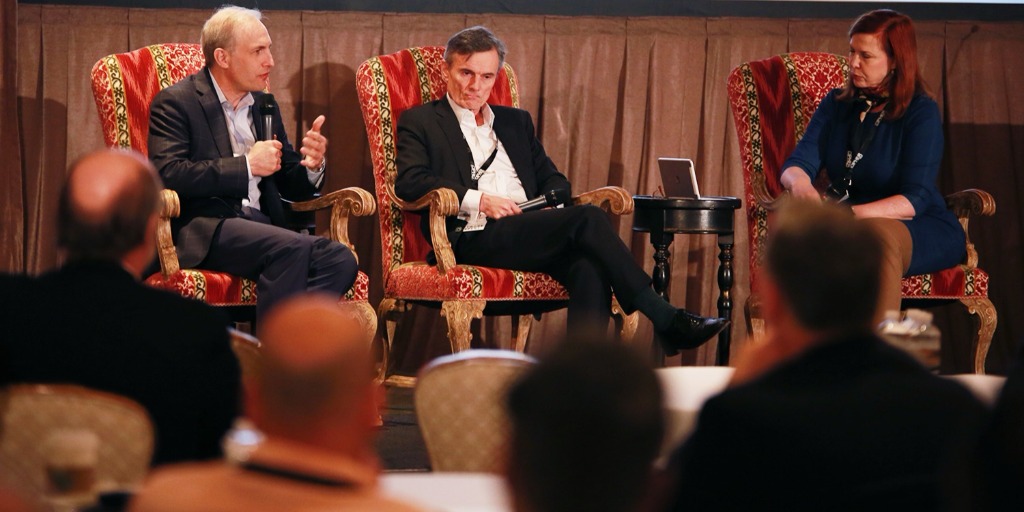 Cipher Brief experts Matt Olsen and Nick Fishwick tackled the state of the U.S. alliance with the “5 Eyes” – the U.S., Britain, Canada, Australia and New Zealand – in discussion with Executive Editor Kimberly Dozier at Sea Island. Their overall conclusion? Despite the Trump administration’s early controversial comments about NATO and criticism of Britain among others, intelligence sharing and counterterrorism cooperation continues unabated – for now.
Cipher Brief experts Matt Olsen and Nick Fishwick tackled the state of the U.S. alliance with the “5 Eyes” – the U.S., Britain, Canada, Australia and New Zealand – in discussion with Executive Editor Kimberly Dozier at Sea Island. Their overall conclusion? Despite the Trump administration’s early controversial comments about NATO and criticism of Britain among others, intelligence sharing and counterterrorism cooperation continues unabated – for now.
“The relationship with the U.S. has absolutely underpinned British security strategy since the end of the second World War. Despite any ripples you may hear out of Washington, there is a rock solid relationship between the U.S. and the UK, which has been referred to as a ‘special relationship.’ There is a pretty solid sense of security in the UK that regardless of who is in power in Washington in perhaps three or seven years, it’s an absolutely trustable strategic relationship.
“The relationships that I am familiar with are relationships between senior national security officials, and the assumption that we work on in the UK is that we have open dialogue with our American counterparts. And it’s an open dialogue underpinned by decades of deep trust, both personal and based on sharing incredibly sensitive intelligence both ways. The UK intelligence and diplomatic communities absolutely assume that what they have with America is a unique and strategically vital relationship. I don’t think they are going to be too blown away by what’s happening at the very top. If what happened at the top suddenly led to intelligence not being shared, that’s what would worry me, but I’m not seeing the slightest suggestion that’s happening.”
“In the Five Eyes context – with the U.S., UK, Canada, Australia, and New Zealand – you have the highest level of trust between intelligence partners anywhere. But even within that community there are different national interests, different intelligence cultures, different legal frameworks, etc. So the five eyes is about a level of trust. But it’s not necessarily going to be something critical, say to U.S. national security, the way many intelligence relationships outside the five eyes can be especially if they are players that have access to really critical information.”
“The relationship between the U.S. and the UK is such a fundamentally important relationship to the U.S. and our security that it’s solid and the U.S. is a good ally. But if you broaden the question out more generally to, ‘Is the U.S. is a good ally?’ by many measures it depends. On certain matters, the U.S. is solid and reliable. But the broader trend indicates that there is reason to be concerned about how good of an ally the U.S. is.
“Are we reliable? Are we consistent? Are we trustworthy? Are we continuing to show leadership in the world? Can we be depended on to say the same thing from one day to the next such that our allies around the world can depend on what we are saying? Do we have a clear strategy that’s articulated at every level of the government? The trends are negative in that regard, and there is reason to be concerned about our role as a leader in the world as a good ally given the direction that the current administration is taking on a number of issues.”
On U.S. Response to Accusations of Russia poisoning former spy
Fishwick:
“I think everybody in the UK was delighted when the U.S. responded in the way that they did and we were delighted when our other allies responded in the way that they did.”
Counterterrorism Cooperation
Olsen:
“When I think about the paradigm example of cooperation among intelligence officials across countries, it’s on counterterrorism. In my experience, the imperative to share information was so strong in the terrorism realm that it led the way for other types of sharing. The great lesson of 9/11 was the importance of sharing information across foreign and domestic intelligence by CIA, FBI and all those collecting it.”
How Brexit could impact UK Intelligence
Fishwick:
The focus of UK intelligence, security, and military policy will be that Brexit makes no difference to the UK’s security. It makes no difference to our dependence on NATO for security and it makes no difference to the special relationship with the U.S.
What I worry about is that it may start to affect the way the Europeans see the UK. The UK’s had a good influence with European intelligence and security agencies, usually on a bilateral basis. We have been helpful in terms of keeping their standards high and keep asking those questions about if they have intelligence that can help. The UK will do everything that it can to maintain those relationships
But what I’m worried about is if this suddenly changes the psychologically of the way the European intelligence services see the UK and they see us as not quite part of the same team as them, not as trustworthy or not sharing the same values as them.
For the U.S., I don’t think it will make a difference and I don’t think we can have a better relationship.
No comments:
Post a Comment